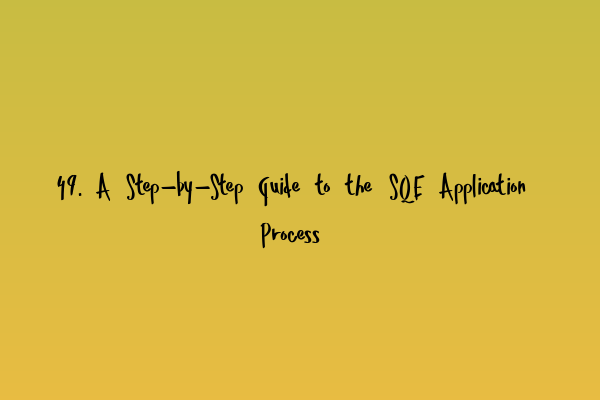49. A Step-by-Step Guide to the SQE Application Process
Are you considering taking the Solicitors Qualifying Exam (SQE)? It is important to understand the application process in order to ensure a smooth and successful journey towards becoming a qualified solicitor. In this step-by-step guide, we will walk you through the application process, providing valuable insights and tips along the way.
1. Research and Understand the SQE
Before beginning your application, it is crucial to research and understand the requirements and structure of the SQE. The Solicitors Regulation Authority (SRA) provides detailed information on their website about the exam format, assessment methods, and key dates. Familiarize yourself with this information before proceeding.
2. Choose a Suitable Preparation Course
Preparing for the SQE is essential to perform well on the exam. Consider enrolling in a reputable and comprehensive preparation course such as the SQE 1 Preparation Courses and SQE 2 Preparation Courses offered by FQPS. These courses provide comprehensive coverage of the exam syllabus and offer practice resources like SQE 1 Practice Exam Questions and SQE 1 Practice Mocks FLK1 FLK2, helping you gain confidence and skills required to excel in the exam.
3. Gather the Required Documentation
Before starting the application process, collect all the necessary documentation you will need to complete your application successfully. This may include academic transcripts, qualification certificates, and identification documents. Ensure all documents are up to date and readily available.
4. Create an Online Account
Visit the SRA website and create an online account. This will allow you to access and complete the SQE application form. Make sure to provide accurate and up-to-date information while creating your account.
5. Complete the SQE Application Form
Once you have your online account, you can start filling out the SQE application form. Provide all the required information accurately, including personal details, educational background, and work experience. Take your time to double-check all the information entered to avoid any errors or omissions.
6. Pay the Application Fee
Upon completing the application form, you will be prompted to pay the application fee. Ensure you have the necessary funds available and be prepared to pay the fee promptly. The SRA website will provide specific instructions on available payment methods.
7. Submit the Application Form
After reviewing and finalizing your application form, it is time to submit it. Take a moment to ensure all the information is correct and complete. Once submitted, you will receive a confirmation email acknowledging the receipt of your application.
8. Prepare for the SQE Exam
While waiting for your application to be processed, utilize this time to continue your preparation for the SQE exam. Enroll in the aforementioned SQE preparation courses, such as SQE 1 Preparation Courses and SQE 2 Preparation Courses, to enhance your knowledge and skills. Practice with resources like SQE 1 Practice Exam Questions and SQE 1 Practice Mocks FLK1 FLK2 to familiarize yourself with the exam format and gain confidence in your abilities.
9. Check the SRA SQE Exam Dates
Stay updated with the SRA SQE Exam Dates to know when the exams will take place. Knowing the dates well in advance will allow you to prepare your study schedule and plan accordingly. Visit the SRA website or refer to the article on SRA SQE Exam Dates for more information.
10. Stay Informed
Throughout the application process, it is crucial to stay informed with any updates or changes made by the SRA. Keep an eye on their website and regularly check for notifications or emails regarding your application status. Being proactive and well-informed will help you navigate the process smoothly.
By following this step-by-step guide, you will be well on your way to completing the SQE application process successfully. Remember, proper preparation and research are key to achieving your goal of becoming a qualified solicitor. Good luck!
